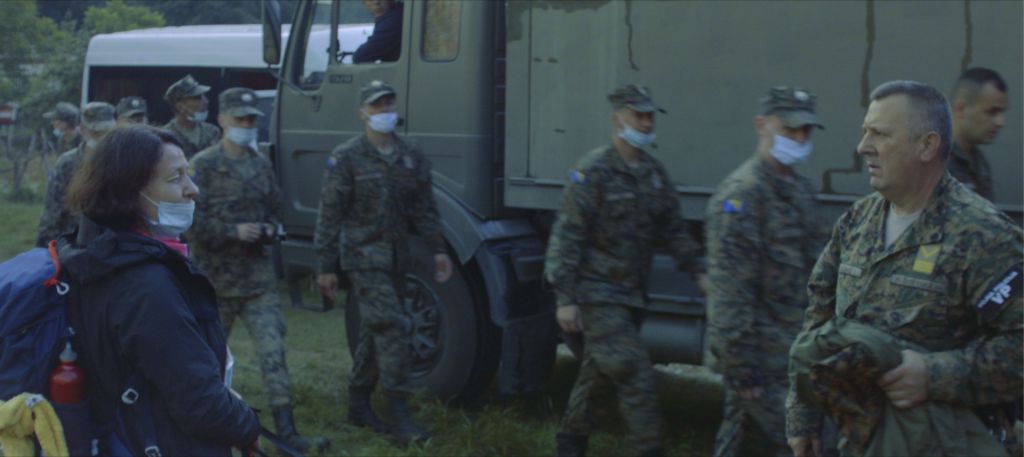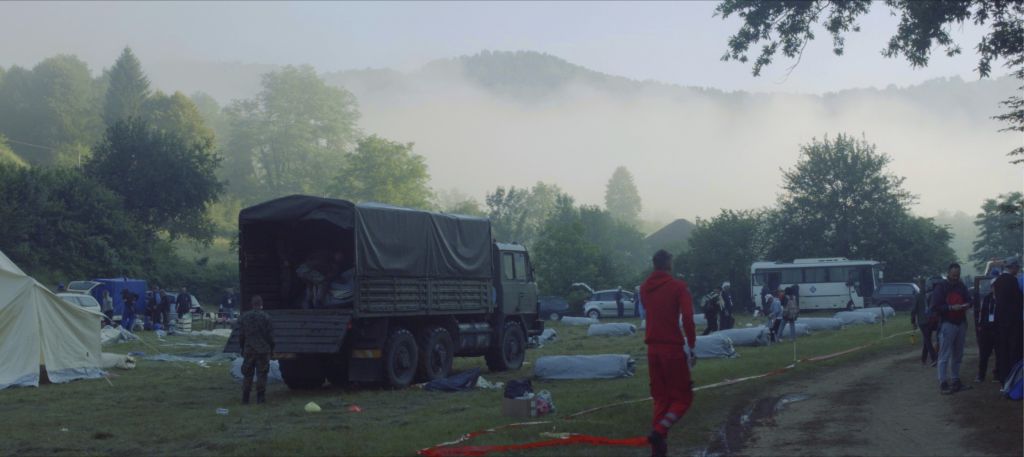Joshua Jádi is a student at Film Academy Vienna. In the summer of 2020, he accompanied the Marš mira [March of Peace], an important annual event commemorating the war crimes in Srebrenica, Bosnia and Herzegovina, together with a three-person film crew under the most unfavourable conditions.
During the March 2020 outbreak of the COVID-19 virus in Europe, Film Academy Vienna directing student Joshua Jádi caught wind of a friend’s plans in connection with the project Marš mira, a peace walk in commemoration of the genocide in Srebrenica that was planned to take place during the summer.“ I wanted to give something back to the family of this strong woman, whom I’ve known for 25 years and who’d like to complete this entire walk in memory of her brother,” says Joshua Jádi in description of his primary motive in producing this documentary film. “And I was conscious of the fact that she would only once be able to muster up the energy to embark upon this difficult journey.”

Joshua Jádi immediately set about planning his filming project but had to drop everything after just a few days: Austria had entered its first lockdown.
So throughout his documentary film instruction at the Film Academy during the summer semester, Jádi continued mulling over this project and how it might continue as a theoretical exercise. “Then, news suddenly arrived from Bosnia that the march would go forward despite COVID, seeing as this was the 25th anniversary of the events to be memorialised. And that allowed me to hope once more that I might be able to realise the project after all.” The weeks that followed were particularly nerve-racking for this enthusiastic documentarian. Every day, the prospects for his project wavered back and forth between realisation and failure. “Nobody knew what would happen the next day—which is why it was so difficult to figure out just what would be possible,” Jádi remembers. But despite frequent thoughts of giving up, he decided to press on. “When the entire world stands still, it’s our job to go out and film whatever’s happening. After all, we have an obligation to document the events of our times.”

The next setback came when the director learned that, due to COVID-19, a mere 100 men would be permitted to accompany the Marš mira. “But I then got the spontaneous idea of bringing along our protagonist as a translator. And the government authorities in Bosnia ultimately granted me permission to come with my crew, limited to three individuals, and accompany the march for three days subject to the observance of certain safety precautions.”
The next obstacle came shortly before filming commenced. Three days prior to their departure, Austria went on red alert and closed all universities—with the consequence that Jádi and his crew were no longer able to access the Film Academy’s equipment. “It was really frustrating, because although the Film Academy provided me with as much support as it could, I now had to finance the filming on my own. What’s more, half of the crew was already on location—which meant that it was too late to call the whole thing off.” Within the space of just a few days, however, Jádi had organised his own equipment. And he was also granted last-minute financial support from the hmdw’s emergency assistance fund. But still, “When we finally set off on our trip, it was with the feeling that our project would still end up failing somewhere along the way.”
Despite the numerous setbacks, they ultimately were able to begin shooting. Jádi describes the many moving images that resulted as at once impressive and disturbing. And due to the conditions imposed by the coronavirus pandemic, they seem all the more reminiscent of the real-life event being commemorated: “The march was accompanied by the military, and people got called out of their tents in order to have their temperatures taken. So at first glance, it looks somewhat like it did back then,” recalls the young director of his observations.

Despite the many obstacles and setbacks during the project’s planning and realisation phases, Joshua Jádi and his crew did manage to complete their film. “We’re serving a greater cause, here. It wasn’t us or the film that was important, but the contemporary document that resulted at the end—and the fact that I’m now able to show the family of our protagonist just what a strong and fantastic woman she is. It was this motivation that gave me the strength to continue each and every day.”

